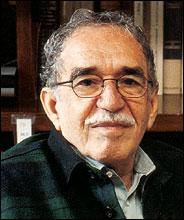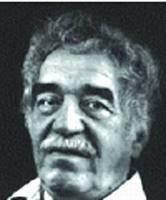作品信息
這本書目前沒有中文譯本,由著名音樂製作人高曉松根據英譯本轉譯而來。
中文名《昔年種柳》(高曉松版),書名《MemoriesofMyMelancholyWhores》,作者加西亞.馬爾克斯,中文譯者高曉松。
譯文時間:2011年4月-8月(高曉松版)
內容簡介
Memories of My Melancholy Whoresis Gabriel García Márquez’s first work of fiction in ten years, written at the height of his powers, the Spanish edition of which Ilan Stavans called, “Masterful. Erotic. As hypnotizing as it is disturbing” ( Los Angeles Times).
 GabrielGarcíaMárquez(馬爾克斯0
GabrielGarcíaMárquez(馬爾克斯0On the eve of his ninetieth birthday, our unnamed protagonist–an undistinguished journalist and lifelong bachelor–decides to give himself “the gift of a night of wild love with an adolescent virgin.”
The virgin, whom an old madam procures for him, is splendidly young, with the silent power of a sleeping beauty. The night of love blossoms into a transforming year. It is a year in which he relives, in a rush of memories, his lifetime of (paid-for) sexual adventures and experiences a revelation that brings him to the edge of dying–not of old age, but, at long last, of uncorrupted love.
Memories of My Melancholy Whoresis a brilliant gem by the master storyteller.
作者簡介
 加夫列爾·加西亞·馬爾克斯
加夫列爾·加西亞·馬爾克斯加布里爾·加西亞·馬爾克斯,1927年3月6日生於哥倫比亞阿拉卡塔卡。1940 年遷居首都波哥大。1947年入波哥大大學攻讀法律,並開始文學創作。1948年因哥倫比亞內戰中途輟學。不久他進入報界,任《觀察家報》記者。1955年,他因連載文章揭露被政府美化了的海難而被迫離開哥倫比亞,任《觀察家報》駐歐洲記者。1960年,任古巴拉丁通訊社記者。1961年至1967年,他移居墨西哥,從事文學、新聞和電影工作。之後他主要居住在墨西哥和歐洲,繼續其文學創作。1975年,他為抗議智利政變舉行文學罷工,擱筆5年。1982年,獲諾貝爾文學獎,並任法國西班牙語文化交流委員會主席。1982年,哥倫比亞地震,他回到祖國。1999年得淋巴癌,此後文學產量遽減,2006年1月宣布封筆。BECAUSE the great subject of the fiction of Gabriel García Márquez is time, no reader of his luminous, strange new book should fail to be aware of exactly how much time its author has spent on earth: on the day of the publication in English of "Memories of My Melancholy Whores," García Márquez will have lived 78 years, 7 months, 3 weeks and 4 days, and he continues to write, as he so often has, about the people for whom time has seemed to stand still. He has always been most interested in the extremely old and the extremely young - for the reason, I think, that our first experiences of the world and our last are the ones that stop us in our tracks, and turn the long confusion of our days into something like stories.
Caleb Bach
GaM. K. Perker
The hero and heroine of "Memories of My Melancholy Whores" are a 90-year-old man and a 14-year-old girl, both nameless, who meet periodically in a room in Rosa Cabarcas's brothel - "the theater of our nights," the old man calls it - and, more constantly and more vividly, in his fevered imagination, where the curtain never comes down. The nonagenarian narrator is the latest in an illustrious line of cranky, obsessive García Márquez geezers, of which the most memorable, perhaps, is the romantic madman Florentino Ariza, whose determination to woo and win in his 70's the woman who spurned him in his 20's is the perpetual-motion machine that powers "Love in the Time of Cholera." But the writer was only in his late 50's, a mere pup, when he invented Florentino Ariza and granted that elderly fool for love the belated fulfillment of his desire. These days, García Márquez needs a dirtier, older dirty old man just to satisfy his insatiable taste for novelty, his lust for sudden and unforeseeable accesses of meaning, his itch to probe the mysteries of last things.
And the central codger of "Memories of My Melancholy Whores" seems, at least at the outset, a very dirty old man indeed. The story begins, with García Márquez's characteristic hit-the-ground-running conciseness, like this: "The year I turned 90, I wanted to give myself the gift of a night of wild love with an adolescent virgin." A superb opening - Edith Grossman's translation is, here and elsewhere, elegant and exact - but not, perhaps, the sort of statement that generates waves of good feeling toward the speaker. The peculiar charm of this narrator, though, is that he really doesn't give a damn what his audience thinks of him. "I'm ugly, shy and anachronistic," he writes, by way of introducing himself, and he's just warming up. "I am the end of a line, without merit or brilliance," he calmly informs us; and despite enjoying some local fame as a critic and newspaper columnist in his native La Paz, he admits to being "a mediocre journalist." His lechery is, in fact, among his more attractive qualities; it is, in any event, one of the few areas in which he has truly distinguished himself. "I have never gone to bed with a woman I didn't pay," he writes, and with sheepish pride reports that he was "twice crowned client of the year" in the city's red-light district.
That brief moment of boastfulness is a rarity in "Memories of My Melancholy Whores." Mostly, this old man is beyond pride, and beyond shame, too. Because García Márquez doesn't often tell his tall tales in the first person, and because the story inevitably evokes comparisons to "Lolita," readers might expect this little book to be more of a departure from its author's usual, unmistakable style - the lulling, deadpan bedtime-story tone that has always enabled him to get away with both murder and the more improbable kinds of love. Some might even manage to persuade themselves that this monologue is, like Humbert Humbert's, an ironic apologia, a literary game whose object is to catch the speaker out in his evasions and self-deceptions.
But that's not at all what García Márquez is up to here. The cunning of "Memories of My Melancholy Whores" lies in the utter - and utterly unexpected - reliability of its narrator. This daft coot is, in his way, as trustworthy as St. Augustine (whom he does not, I hasten to add, otherwise resemble) because his story is, like the saint's, a conversion narrative. His reason for writing, he says, is to record "the beginning of a new life at an age when most mortals have already died," which means, of course, that he has no motive to be anything but brutally honest about the now-despised former life, the 90 years, to the minute, he "wasted" (his word) before seeing the light.
The light is, in this case, nothing celestial, just the "miracle of the first love of my life at the age of 90," the object of his passion being the anonymous teenage virgin whose naked body he rents from Rosa Cabarcas: a girl who is usually asleep when he comes to her, who rarely speaks even when she's awake, and with whom he does not consummate his physical desire. "I preferred her asleep," he admits, and, sounding disturbingly like James Stewart in "Vertigo," further confesses that "seeing and touching her in the flesh, she seemed less real to me than in my memory."
Yes, the young virgin - whom the old man calls Delgadina, after a girl in a song - is an abstraction, and that, as we all know, is no basis for a mature, healthy relationship. The wonderful joke of "Memories of My Melancholy Whores," though, is that its hero's life is changed by the late onset of a profoundly immature and not especially healthy emotion: the painful, idealizing, narcissistic romanticism of adolescence. And the narrator knows all too well how ludicrously out of season this desperate yearning is, how silly it is for a man his age - the whores' client of the year, no less - to be born again into puppy love.
Who needs Nabokovian verbal ironies when time itself plays practical jokes like this? The besotted old man of "Memories of My Melancholy Whores" may or may not actually deserve his 11th-hour redemption, but neither he nor García Márquez is inclined to question it too rigorously, to look this particular gift horse in the mouth. In the end, a marvel is a marvel, best left unexamined, and all any of us can do, this funny, dirty old story says, is laugh. The wisdom the narrator comes to after his great conversion is so mundane, so homely, it's hilarious: "When I woke alive on the first morning of my 90's in the happy bed of Delgadina, I was transfixed by the agreeable idea that life was not something that passes by like Heraclitus' ever-changing river but a unique opportunity to turn over on the grill and keep broiling on the other side for another 90 years."
"Memories of My Melancholy Whores" is García Márquez's first book of fiction in a decade - since "Of Love and Other Demons," which was also a short novel about an unlikely romance. He has filled that time with memoir-writing: the first, large volume of his autobiography, "Living to Tell the Tale," was published here in 2003. So perhaps it's natural, after 10 years of looking back, that he has now treated himself, and his readers, to this sprightly, perverse little fable about looking forward. Not many of the remarkable storytellers of Latin American literature's boom years are left: Borges and Cortázar are gone, and Puig and Donoso and Arenas; and earlier this year we lost the wily and passionate Guillermo Cabrera Infante, too. But Gabriel García Márquez is still around, turning on the grill, and gratefully. Although he has spent a bit less time in this world than the moonstruck narrator of his latest book, he is now old enough, at last, to feel that every new story arrives as a miracle, and to understand that as long as he writes he can keep being born again.
作品英譯文
第一章
日子翻回我九張兒那年,那時我打算送給自己一份生日好禮——找個雛兒,過個夜,撒點兒野。我想起了羅莎.卡巴卡斯同志,一個有了好果兒就立馬發給熟客的地下老鴇。我之前從沒中過伊的淫招兒,但伊也從沒相信我是個脫離了低級趣味的清教徒。我撥電話時猜想伊肯定會一臉壞笑地對我說:清教徒也會被如梭歲月打敗嘿嘿。
鑒於這位老太太只比我小一點點並且好多年沒了訊息,我猜伊八成已經死了。沒想到電話只響了一聲就接通了,這嗓音我太熟了,於是我開門見山:
到日子了!
伊先嘆了口氣,然後老練地奪回了主動:倒霉蛋大知識分子,你消失了二十年,一出現就要求那么高!
然後伊發了一串果兒,可惜都被人用過。我嚴詞拒絕,堅持必須是雛兒,而且必須當晚就用!
伊提高了聲調:你急著證明什麼?
我傷不起,於是回答:不用證明!我自己清楚!能幹乾不能幹就看!
伊不為所動:大知識分子自然什麼都清楚,但隔行如隔山,告訴你,這世道就剩下處女座的人還敢自稱處女了,比如八月底生人的你。你得給我時間!
那玩意兒說來就來!我說。
那玩意兒可以持續!伊永遠顯得比男人淵博。
然後伊提出用兩天時間讓伊做個徹底市場調研的小建議。
我再度嚴詞拒絕,說這種事兒對我這把年紀的人完全是度秒如年,一刻不能等。
沒戲!伊毫不猶豫地說——不過你還別說,這事兒還真他娘的刺激,你一小時之內等我電話!
不用我坦白從寬,正常人從二里地以外也能看出我又醜又靦又過時。直到今天,我的老良心讓我正式承認這些老缺點之前,我都偽裝得很好,甚至裝成了這些辭彙的反面。我今天敢給羅莎.卡巴卡斯同志打這個令人髮指的電話,是因為我發現沒幾個人到了我這把年紀還好意思活著,我決定過一種嶄新的,彪悍的人生。
在聖尼古拉斯公園朝南的一側,我住在一所殖民時期的房子裡。爸爸媽媽曾在那兒活著並死去,我在那兒度過了我全部的單身無產者時光,並打算在我呱呱落地的那張床上悠久而孤單地無疾而終。
爸爸趕在十九世紀終了的時候從政府拍賣中買到了這所房子。他把底層租給了一個賣奢侈品的義大利家族企業,自己住在二層,和這個家族的一個女兒——佛羅麗娜.德.迪奧斯.卡加曼妥思——傑出的莫扎特演奏者,會多種語言的義大利民族主義者,以及這座城市有史以來最美麗聰慧的女性——我的媽媽。
房子寬敞明亮,有粉飾的穹頂和義大利馬賽克地面,四扇玻璃門外是合圍的陽台。早春的繁星夜,媽媽和她的表姐妹們會在那兒憑欄清唱愛之詠嘆調。從那裡望出去,越過聖尼古拉斯公園的巍巍教堂和哥倫布雕像,越過河岸碼頭上的層層倉庫,越過莽莽地平線,大馬格達萊納河靜靜去往百里外的海洋。
房子唯一的缺點是陽光會在白天依次照進每一扇窗,午睡時得把它們一扇扇關上。我32歲開始過形單影隻的生活時,搬進了爸爸媽媽從前的臥室,打了一條通道去往書房,然後賣掉所有孤魂野鬼過日子用不著的東西——其實就是所有東西,除了書和一架會自動演奏的鋼琴。
我在《和平日報》當了40年電訊編輯,工作內容是攔截從空氣中路過的短波電台和電報里的世界各地新聞,然後編寫成本地人能看懂的小文章。這種早已被時代淘汰的工作如今給我提供著微薄的退休金,數目甚至比我教授國文和拉丁文法所得還少。我堅持寫了半個世紀的星期天專欄幾乎是免費的,更別提我那些吹捧偶爾來這座小城演出音樂和戲劇的半紅不紅藝術家們的小冊子了,不讓我倒貼錢已很幸福。
除了寫字,我不會幹任何事,並且由於不善於編織戲劇化衝突,我連這門手藝也做不到高屋建瓴。之所以堅持寫字這門營生是因為我相信這輩子看了那么多閒書,總會分泌點靈感吧。說白了,我排在長長的隊尾,沒啥榮譽和光環,沒啥好意思留給後代,除了我打算用盡我全部腦漿子來記錄的——我那可歌可泣的愛情。
像所有的日子一樣,我在90歲生日那天早上5點醒來。因為是個星期五,唯一需要做的事就是給《和平日報》寫那個星期天專欄。這個早晨流年不利:後半夜開始骨頭疼,屁眼像著了火,還有滾滾雷聲預示著連續三個月大旱之後的暴風雨。我趁著煮咖啡的時候洗了個小澡,然後就著兩片木薯麵包喝下被蜂蜜搞得齁甜的一大杯,吃畢,才穿上我居家的麻布行頭。
這期專欄的主題必須是我的90大壽。我從沒料到歲數這玩意能像房頂的窟窿數目一樣讓人清楚地數出你還有幾天活頭。在我很小的時候,聽說人死後如果頭髮里的跳蚤逃進枕頭會導致全家蒙羞。這刺激了我,讓我從讀書起就不停剪頭,如今即使就剩下幾根老毛,我也會用人家給流浪狗洗澡的那種強力去污肥皂使勁搓洗。暮然回首,原來我自幼就克己復禮,視死如歸。
我已醞釀了好幾個月,以便讓我的生日專欄不再像過去N年那樣顧影自憐,而是相反地要為耄耋大唱讚歌。我從自己何時有感於自己老了開始動筆,因為那只是不久以前的事。
在我42歲的時候,我因為背疼影響呼吸而去看過醫生,該醫生覺得沒啥大不了:這類疼痛在你這歲數很正常。他說。
“在我這歲數,”我說,“有什麼是不正常的?”
該大夫臉上浮現一種叫憐憫的,笑著說:我覺得你是個哲人。
那瞬間我第一次琢磨了一下老去的問題,但沒幾天就忘了。接下來的發現是經常在不同時代的早上醒來,發現疼痛的部位神出鬼沒。有時感覺死神已經衝著我舔爪子了,可第二天又遁去無蹤。我聽說人變老的第一個徵兆是越長越像親爹,這樣看來我將永葆青春,因為我這張馬臉無論如何也不像我爸的生猛加勒比樣貌或是我媽那羅馬雕塑般的容顏。實際上,改變是靜悄悄進行的,你內心覺得你還是從前的那副皮囊,別人從皮囊外觀察就不是那么回事了。
活到五張兒多的時候我開始腦補我的老年生涯,因為我的記憶開始衰退:我會把房子掀個底朝天找眼鏡最後發現它就在我臉上,然後帶著眼鏡去浴室沖澡,接下來就把老花鏡戴在近視鏡外面看書;有一天由於忘了已經吃過早點我吃了第二頓;我開始從朋友們擔心的眼神里意識到他們不好意思提醒我正在講上周剛給他們講過的故事。於是我搞了兩份記憶訓練表,一份是熟人們的大頭像,一份是他們的名字,把兩張表一次次對應起來。可真到了該打招呼寒暄的時候,我又對不上號了。
我的性能力並不依賴我本人,而是全靠婦女們,婦女們對這件事有“知”有“識”。我心中暗笑那些八張兒的小伙子們,他們不停諮詢各種醫生,擔心某個悲催時刻的突然降臨,殊不知到了九張兒他們會變得更加絕望。沒啥大不了的,這就是活著的風險之一。可話又說回來,老了能忘記那些浮雲般的爛事兒也是人生的成就之一。並且記憶這玩意兒是有選擇的,古希臘雄辯家西塞羅同志曾經雄辯地指出:老傢伙們永遠記得最心愛的細軟藏在哪個角落。
基於以上胡思亂想,當然遠不止這些——當八月的驕陽穿過杏樹林梢,郵船帶著因為乾旱水淺而延遲了一周的遠方來信駛進港口的引河,我寫完了專欄的初稿,對鏡默禱:給您請安,九十歲!
我不打算騙自己,好像我清楚為什麼非要用淫蕩之夜為自己慶生而給羅莎.卡巴卡斯同志打了那個電話,那只是鬼使神差或者叫魔幻使然。我的身體已經安詳聖潔了多年,我的時間全部被用來看閒雜名著和去音樂廳被音樂搞嗨。可生日這天的慾火仿佛是被上帝點著了的炮仗。打完電話,我寫不下去了。
我把吊床掛在書房裡早晨陽光沐浴不到的地方,躺下,在焦慮等待中胸口發悶。
很久以前我曾是個富二代,直到我多才多藝的媽媽在五十歲上去世,然後是我那一絲不苟到即使一絲不掛也找不出一絲缺點的爸爸在單人床上合了眼——那天正是尼爾蘭迪亞條約簽訂日,這份條約結束了“千日戰爭”和上個世紀數不清的內戰。和平對這座小城的改造超出人們的憧憬。在一條原來叫安可大街,後來叫骯髒的阿貝羅現在叫帕西爾科隆的街上,成群結隊獲得解放的婦女們瘋癲於酒肆。這座我靈魂之城的敦敦民風和淳淳陽光深深吸引了本地和外來的人們。
我這輩子從沒和不要錢的果兒上過床,對少數非職業性工作者,無論花言巧語還是強買強賣,反正最後都讓她們收了錢——即使有些錢被個別婦女甩進垃圾桶里。
我20歲的時候開始製作一份果兒單,記錄與我發生過關係的婦女的姓名、年齡、住址和用簡略符號標註的做愛偏好。到我53歲的時候這份表格排到了 514號。在身子骨實在對付不了那么多果兒之後,我不用表格也能隨時聯絡到那寥寥無幾的幾枚,就終止了記錄。我有我自己的倫理道德:我從不參加聲色犬馬的派對,也不在公共場合勾引婦女,從不泄露任何秘密,也不與任何人分享我無論是靈或肉的奇遇。因為我從小就相信:出來混早晚要還的。
唯一與我保持了多年不尋常關係的是忠實可靠的達米阿娜(這名字也是壯陽藥的意思。譯者注)。如果可以稱之為姑娘的話,伊是個有著印第安外觀的強壯村姑,在我家幫傭幹些粗活。我喜歡伊幹活時赤著足躡手躡腳,不會打擾我寫字。
至今猶記我躺在門廳的吊床上讀一本叫《傲慢的安達盧西亞姑娘》的書,忽然瞥見伊彎著腰在水房洗衣服,裙子短得露出了一輪比圓括弧還圓的屁股。我慾火中燒,疾步上前一把掀起伊的裙子,褲衩扒至膝下,從後面搞了進去。
“喔,老爺!”直到我完事拔出來,伊才帶著哭腔說了這唯一的台詞。身體不堪其辱地劇烈震顫但仍咬牙穩穩站著。我給伊的嫖資是最貴的果兒的兩倍,可伊不拿民眾一針一線。我只好把伊的薪水漲到差不多每月夠搞一次的水平,每個月,照例在伊洗衣服的時候,照例從背後。
一次我忽然想到整理這些香艷材料會有助於我書寫自己迷茫不幸的人生,然後一瞬間,這部書的名字蹦入了腦海:《昔年種柳》。
除了這些尋花問柳,我的日子了無生趣:父母雙亡,單身無望,在印第安保留區的卡塔赫納花博會詩歌比賽上四次入圍未獲獎,平庸小記者和一張只有漫畫家盯著看的經典馬臉。總之,自從19歲那個倒霉的下午,媽媽牽著我的手去往《和平日報》社,問人家能否刊登我在國文和修辭課上撰寫的一篇校園生活流水賬開始,我的生活就廢了——文章在那個星期天登出來,還附有編輯大人鼓勵的小序。很多年後我才知道,為了刊登那篇以及我接下來一發不可收的七篇稿子,媽媽付了報紙不少錢!不過我那時已經不感到羞恥了——我已經靠星期天專欄、電訊編輯和音樂評論營生了。
我以優等成績拿到學士學位後,就開始同時在三所公立中學教國文和拉丁文。我是個無培訓無假期的窮教書匠,並且那些僅僅為了逃避家暴才來學校的孩子們對我也毫不施以同情。
我唯一能做的就是用硬木戒尺震懾群小,這樣最起碼他們還能被迫誦讀我最心愛的詩篇:喔,法比奧,多么憂傷,在你眼前的荒蕪田園和陰霾山崗,曾經是明珠般的義大利市場。。。
在老去後我對著鏡子忽然明白了那時學生們在背後給我起的外號:陰霾山崗桑。
這些就是生活給我的全部,我照單全收,不求多福。我在課間獨自午餐,下午6點下課趕到報社編輯室,攫取划過星際的各種電波。晚上11點報社截稿,我的生活正式開始:我每周有兩三個晚上睡在紅燈區,也就是唐人街,臨幸的果兒數量與品種之多以致於我一年之內兩次獲得最佳恩客桂冠。通常在左近的羅馬咖啡館胡亂搞完晚飯,我會隨便逛進一間妓院,溜進後門。這是我的秘密樂趣,同時也是我工作的一部分——那些官老爺們爽了之後經常向熟果兒透露點政府機密,從沒想到那些硬紙板糊的隔牆是多么不隔音。
當然了,偶爾也能聽到些關於本人的傳聞,大概是說本人義無反顧地耍單兒不結婚的深層原因是從雞姦街頭不良少年中獲得了極大快感。還好我臉皮厚,只要偷聽到對我的人生價值稍有肯定的片言隻語,就會立馬忘了緋聞帶來的不適。
我的心房裡沒有朋友。唯一能蹭進來的是幾條來自紐約的死魂靈。我覺得那座遙遠的大城是五湖四海被判過刑的魂靈聚居之所,一個可以真切忘記過去的地方。
退休之後我幾乎無事可做,僅剩的正業就是每周五下午攜著專欄小文章去趟報社。業餘時間用如下事項填充:去貝拉音樂廳聽音樂會,去我作為創始會員的藝術中心看畫展,偶爾會出席公共改革社團的會議,或者一些更重要的活動比如法布雷加斯在阿波羅劇院的訂婚儀式。
年輕時我喜歡去看露天電影,興奮於銀幕之外的晴朗月蝕或者被瓢潑大雨澆成癆病鬼,但最嗨的還不是那些,而是時常能遇見不為名不為利就為一張電影票跟你上床的小果兒。可自從秀蘭鄧波爾也開始在銀幕上犯騷,我對電影的最後一點熱情也熄滅了。
我的旅行經歷僅限於三十歲前去過四次印第安保留區的卡塔赫納花博會詩歌比賽,以及去聖塔瑪塔參加薩克拉門托.蒙鐵爾女士一座新妓院的開張慶典,那是個令人不快的快艇之夜。
我的宅男生活乏善可陳,吃得少,不挑食。親愛的達米阿娜老了之後已然停止給我做飯,從那時起我的正餐就是報社下班後去羅馬咖啡館搞一份土豆煎蛋卷充飢。
九張兒前夕,沒吃午飯,羅莎.卡巴卡斯的電話等得我心煩意亂,掩捲髮呆。其時蟬鳴正午,驕陽似火。我被沖入窗欞的烈日逼得挪了三次吊床。多年來我已經習慣了在炎夏過生日,可是今天燥熱的情緒讓我很不習慣。四點鐘我放出卡薩爾斯演奏的巴赫大提琴協奏曲企圖讓自己平靜,結果這闕極品音樂不但沒能如往日般輕拂我心,反而導致更加的悲催。第二樂章時我昏昏睡去,節奏仿佛越來越慢,大提琴於睡夢中幻化成長長的汽笛,如滿懷悲傷遠去的一葉孤舟。
電話吵醒了我,羅莎.卡巴卡斯銹跡斑斑的聲音把我拉回蒼老的現實。
傻人有傻福!伊說。“一枚長勢喜人比你想的還妙的小果兒,只是有個缺點——她剛滿14歲。”
我沒搞清伊的潛台詞,於是喜道:我不在乎給人換尿片!
我才不在乎你在不在乎呢。她一字一句地說:我只在乎我為此將面臨的三年牢獄之災,我需要有人買單!(續)
昔年種柳
譯文作者高曉松,著名音樂製作人。
 高曉松獄中翻譯《昔年種柳》
高曉松獄中翻譯《昔年種柳》2011年5月9日22時50分,著名音樂人高曉松在東城區駕車與前車追尾 ,造成四車連撞,4人輕傷。因涉嫌酒後駕車,高曉松已被警方帶走。
《昔年種柳》是今年9月14日被高曉松的助理貼到部落格上的,高曉松的助理稱,“這本書目前沒有中文譯本,高老師從英譯本轉譯而來。由於獄中缺乏工具與資料,翻譯疏漏在所難免,我幫他打字輸入也可能有錯漏,請大家指正。目前國內沒有這本書的出著作權,我們也沒有授權,貼出譯文僅限大家交流。”
記者注意到,隨著高曉松釋放,這篇譯作也隨之受熱捧。截至目前,該譯作閱讀量已超過6萬次,並被大量收藏和轉載。
在某入口網站,有關《昔年種柳》的微博數量超過1.2萬條,絕大部分是網友最近兩天寫下的觀後感和轉載,讚嘆這是“高牆下出靈感”。
網友“Whistler2027”更是表達欽佩之情,花半個小時讀完高曉松譯的《昔年種柳》第一章,不得不說,譯得很好看,語言生動有趣,也很時尚,像什麼“傷不起”,“凌亂了”,讀來令人捧腹。
很多人表達讚許之餘,還不忘“提醒”高曉松將作品翻譯完,“文筆還真是精彩,尤其那字裡行間的京腔京韻,期待看後面的四章。”
隨著高曉松刑滿釋放,他在看守所內翻譯的馬爾克斯作品《昔年種柳》第一章全文也隨之受追捧,網友評價頗高,感嘆是“高牆下出靈感”,並期待高曉松將剩餘四章繼續翻譯完。
![昔年種柳[哥倫比亞加西亞。馬爾克斯所作小說] 昔年種柳[哥倫比亞加西亞。馬爾克斯所作小說]](/img/9/ad0/nBnauM3XwIDOyEDNyUTN1QDM1UTM1QDN5MjM5ADMwAjMwUzL1UzLyEzLt92YucmbvRWdo5Cd0FmLyE2LvoDc0RHa.jpg)
